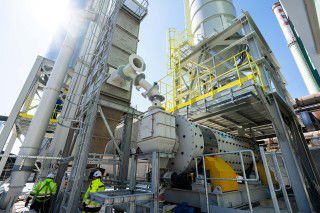The UK cement industry is becoming uncompetitive due to spiralling domestic energy prices, which have been exacerbated by global conflicts and over-reliance on fossil fuels. This has led to falling utilisation rates and increasing imports, according to the Mineral Products Association (MPA). Cement production in the UK has declined from 11.656Mt in 2001 to 8.752Mt in 2023. For 2024, a record low is forecast, reflecting the severity of the crisis.
High energy prices
Much of the concern is focussed on energy supply and prices. UK Prime Minister, Keir Starmer, has stated that the government plans to reduce energy bills by 25 per cent from 2027 as part of its industrial strategy, following changes to energy markets and carbon taxes. Official data compiled by the Institute for Energy Research has shown that industrial electricity prices were around 50 per cent higher in the UK than in France and Germany, and four times as expensive as in the USA.
While a new policy paper on minerals is expected in the next few months, existing UK cement producers are reeling from these high energy prices and a lack of alternatives. Moreover, the elevated energy prices also impact on the producers’ ability to invest in the much-needed decarbonisation of their operations, further eroding their competitiveness.
Imports increasing
As domestic utilisation rates fall, growing import volumes are picking up the slack. Cement imports have doubled in the last decade, with the share of imports reaching 30 per cent of total demand compared to 12 per cent in the 2000s.
Moreover, as the domestic cement industry faces significant challenges, new cement terminals are being built at a frantic pace to import cement and raw materials:
• Türkiye’s Medcem is building a terminal in Liverpool for mid-2026
• Cemminerals NV of Belgium is building a 0.1Mta slag grinding plant in Newport
• Cimpor of Portugal is investing EUR20-25m for its new Bristol terminal
• Invicta is importing pulverised fly ash at Sheerness for Nova Cement, a subsidiary of Medcem and Brett Group.
Dr Diana Casey, MPA’s executive director, said the competitiveness of the UK cement producers has been eroded because foreign businesses, unlike British companies, do not have to pay carbon taxes as part of emissions trading schemes. Meanwhile, the Carbon Border Adjustment Mechanism is not due to become operational until 2026.
Strategic government approach needed
The changing dynamics of energy supply have also been exacerbated by a lack of long-term planning by the UK government, which had missed the opportunity to develop a more strategic approach, argued the MPA.
The government merely offered in its Industrial Strategy document to: "Provide continued relief for materials sectors like cement, glass and chemicals. Through the uplifted British Industry supercharger, eligible energy intensive business in foundational industries can benefit from a reduction in costs." The MPA wants to see the industrial strategy extended to cement producer’s domestic supply chains, such as essential aggregates needed for new homes, factories, laboratories, and energy and defence infrastructure.
The MPA stated, “Without a strategic approach to secure long-term access to these resources, growing demand over the next decade could drive up costs, stall the delivery of national priorities – from housing and the energy transition, to defence and climate resilience – and ultimately constrain UK economic growth.”
